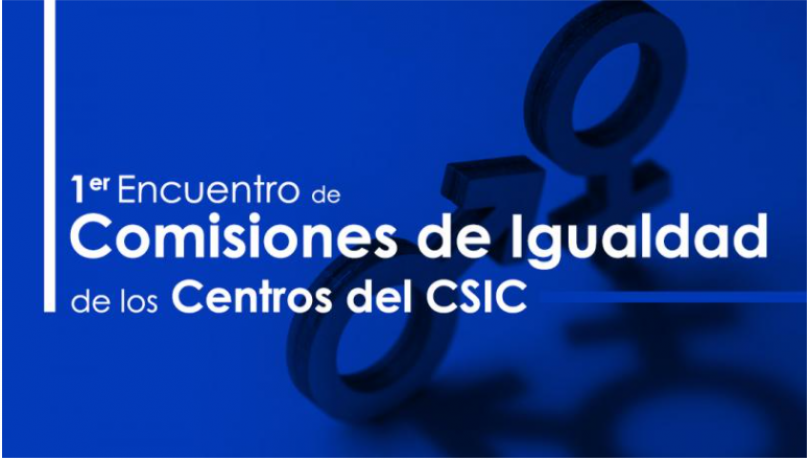The conference, held as part of the European LeTSGEPs project, was organized by the ICM in coordination with the CSIC Equality Committee and the CSIC Women and Science Committee.

The event, which brought together one hundred professionals from thirty the CSIC centers, was held yesterday within the context of the European Project Leading Towards Sustainable Gender Equality Plans in Research Institutions (LeTSGEPs). This project aims to implement Gender Equality Plans (GEP) with the integration of the gender budget approach (GB) in the research centers and universities of the consortium.
The first online meeting of the Equality Committees of the CSIC centers accomplished three objectives: to present the LeTSGEPs project to the CSIC community and inform about the processes that ICM is articulating to implement its Gender Equality Plan; to promote the creation of a Network of Equality Committees from the different CSIC centers as a space for the generation of knowledge, and the articulation and exchange of good practices around the Gender Equality Plans under the leadership of CSIC's Equality Committee; and finally to discuss possible mechanisms for articulating the CSIC Equality Plan with the centers’ specific Equality Plans.
The CSIC president, Rosa Menéndez, opened the event and stated that “CSIC is firmly committed to achieving equality in all areas of its research, administrative and technical staff".
The president also stressed that the work of the CSIC Women and Science Committee, since it was created in 2002, "has been remarkable” and led to the decrease of the glass ceiling index, as a measure of gender imbalances, from 2.33 to 1.35 at present.
In this sense, Menéndez pointed out that since 2013, after the first CSIC Equality Plan was approved followed by a second plan in 2015, an evaluation report has been made yearly. She has also added that in 2018, CSIC introduced the Gender Equality Accreditation Seal, which is now in its third edition. But "we must continue to work more and with more effort", concluded Menéndez.
Josép Lluís Pelegrí, the director of ICM, who has recently received the Severo Ochoa Excellence Award, has mentioned the work carried out at the Institute in the area of gender equality: “ICM aspires to be a research center that encourages collaboration in all areas. A collaboration from and for equality, especially gender equality, cooperation that is enriched by complementarities and that accepts differences without imposing hierarchies”.
After that, Pilar López Sancho (CSIC) presented the work of the CSIC Equality Committee, Beatriz Esteban (CSIC) described the CSIC Equality Plan, and Francisca Puertas explained the work of the CSIC Women and Science Committee.
For her part, Elena Torrecilla (ICM) gave an overview of some of the projects on Gender Equality that are being carried out with European Union funds, whereas Esther Garcés and Silvia Donoso (ICM) presented the European project LeTSGEPs, and described how ICM understands the articulation of the center’s Equality Plans with CSIC's Equality Plan.
The second part of the meeting began with the socialization of routes, work experiences and articulation in networks by the Equality Commissions of different CSIC centers. This include experiences of Sara Soto (ICM), Rosa Fernández (IBE-CSIC), Elena Gómez (IPBLN-CSIC), Cristina Carnerero (IDAEA-CSIC), Silvia Gallego (ICMM-CSIC), Anna May (ICMAB-CSIC) and Josefa Masegosa (IAA-CSIC). The ICMM-CSIC and ICMAB-CSIC have also shared what it has meant to obtain the CSIC Equality badge.
Next, with the aim of advancing in the configuration of the Network of Equality Commissions of the CSIC centers, discussion groups have been organized to specify mechanisms for articulation between the commissions, but also between the CSIC Equality Plan and the Equality Plans that are being developed in the different centers.
Within the discussion groups, a great diversity of routes by the different equality commissions has been evidenced concerning their training, budget and actions. Among the conclusions of the meeting are the need to create equality commissions per center, as well as create community and give visibility to the commissions already created.
Likewise, attendees have requested support from the Network of Equality Commissions to share knowledge, good practices and to advance in the implementation of gender measures. Finally, training and qualification -at different levels- of personnel and the recognition of equality training as merit have been considered key.
The meeting closed with the commitment to continue taking firm steps towards the institutionalization of effective gender equality in the centers of the CSIC and for this, an agenda of actions is drawn up for the Network under the leadership of the Equality Commission of the CSIC.
LeTSGEPs Project
LeTSGEPs is a European project under the Science With and For Society (SWAFS) call and is funded by the European Commission through its Horizon 2020 Research and Innovation Programme (GA num. 873072).
The LeTSGEPs consortium includes, in addition to the ICM, the RWTH Aachen University (Germany), the Institute of Mathematics of the Serbian Academy of Sciences and Arts in Belgrade (Serbia), the Università degli Studi di Messina (Italy), the Faculty of Economics of the University of Tirana (Albania), the Max Planck Society (Germany), and the CY Cergy Paris Université (France), coordinated by the Università di Modena e Reggio Emilia (Italy).
The main objective of LeTSGEPs is to implement institutional changes through Gender Equality Plans. To do so, the project will study the state of the art of the existing measures to achieve gender equality in six research institutions. It will also design and ensure continuity to sustainable Gender Equality Plans inside those institutions, with a particular focus on Gender Budgeting.
LeTSGEPs, which started in January 2020, is a four-year project. During the initial months ICM is carrying out a cross-cutting diagnosis of the gender equality situation in all areas of the centre, and is participating in training activities with the aim of anchoring gender capacity in the centre and its staff. The next steps will allow the formulation of a Gender Equality Plan for ICM.